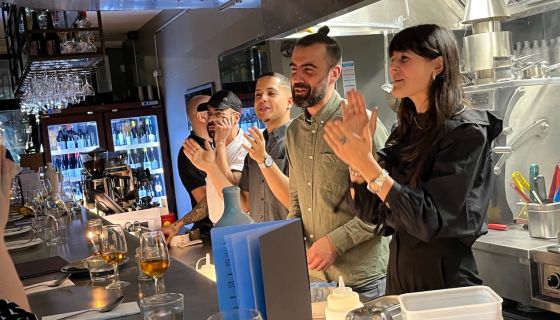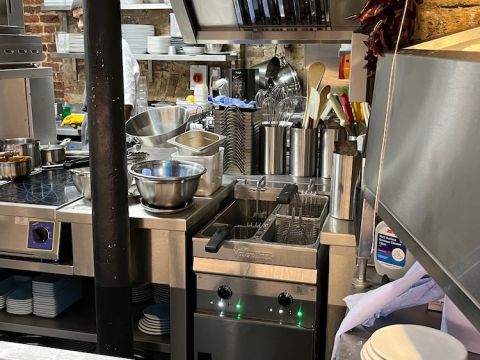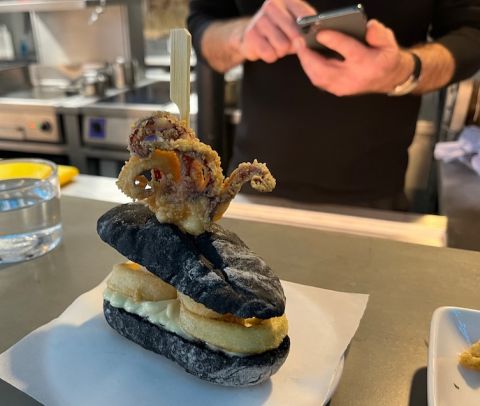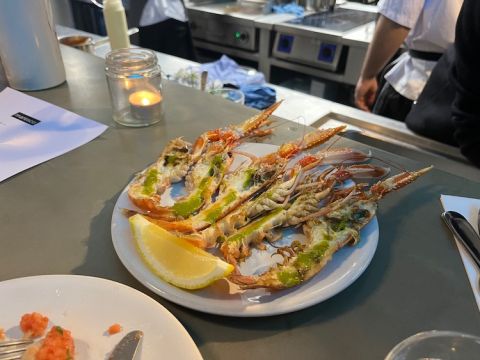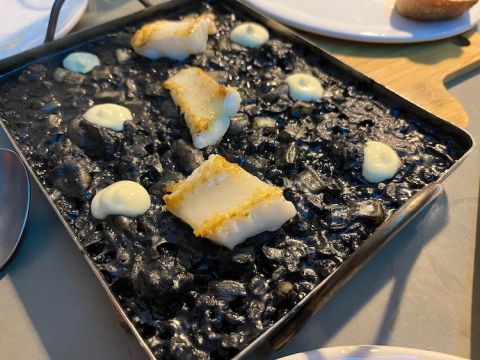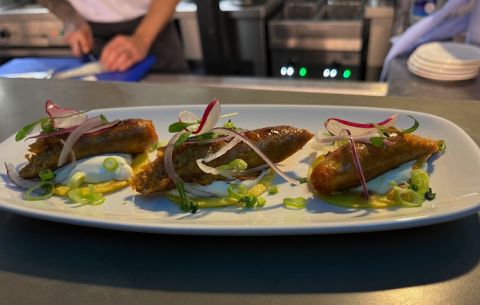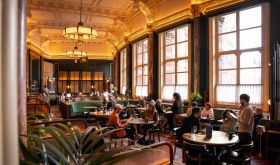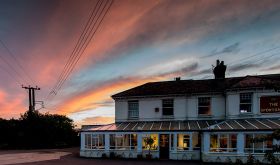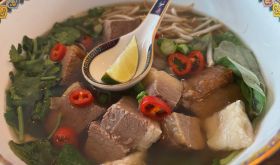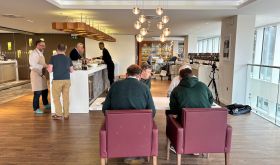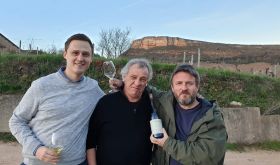Many young men and women are driven into the hospitality industry by memories of trips as a child to foreign countries and the food they encountered there.
France was the country that first inspired Heston Blumenthal to become a chef as he sat in the back seat of his family car. It was holidays in Italy that first lit the flame for Danny Meyer, the renowned New York restaurateur. But it was Spain that inspired Stephen Lironi who explains, ‘travelling by car as a child from Glasgow to Spain in 1974 scarred me for life. As a family we returned year after year and I remember the cultural shift after Franco and the speed at which Spain started to become really modern.’
These ‘scars’ must have been pretty deep because Lironi sublimated them for many years while he pursued a successful career in the music industry (he still describes himself as a sherry aficionado first and record producer second). While in Hollywood he read about the bountiful nature of the catch of his native Scottish fishermen and the dismal fact that most of it was exported to Spain because it was largely unwanted in the UK.
Acutely aware of the nature of Spanish restaurants and tapas bars, Lironi decided to act and in 2013, alongside chef Pablo Rodriguez and general manager Naroa Ortega, he opened Bar Esteban in Crouch End, north London. Then in 2015 they opened Escocesa in Stoke Newington, and in November 2022 the same trio opened Maresco, the conjugation of two Spanish words, mar for sea and esco, short for Escocia or Scotland, on the former site of Yum Cha, on a corner of Berwick Street, Soho.
It is a highly suitable venue for such a restaurant, and one that will only improve when the sun begins to shine and the outdoor seating comes into its own. Everything culinary has been squeezed onto the far corner of the ground floor: there is a Pira oven, a more dramatic alternative to Josper; the fish and shellfish display; room for a huge pile of metal bandejas, the oblong trays that the chefs use for cooking individual portions of squid ink and fideuà, the short Spanish noodles; and there is just enough space for the washers up behind.
I sat twice at the counter overlooking the kitchen and the chefs. There are tables for two by the windows and downstairs there are several tables and chairs for fours and larger groups. It is extremely compact and everything is on show. Below is the view of the kitchen from the bar.
My first meal at Maresco highlighted a quandary: does this place appeal more to food lovers or to wine lovers? The food was excellent: crisp croquetas; deep-fried baby squid; and to show off, a bocadillo de calamar, the squid sandwich shown below (with Lironi in the background) in which the roll had been turned black, having been mixed with a little squid ink, and then sliced and stuffed with mayonnaise and grilled squid before being stapled back together and topped with a fried squid tentacle. With this I drank a glass of extremely appetising white Suertes del Marqués Trenzado 2021 from Tenerife.
The following night I returned in a party of three. The booklet of a wine list beckoned and we began with glasses of fino and amontillado and an order for three Hebridean langoustines (£14 each) that we witnessed taken down from the ice, split lengthways down the middle before being placed on the grill and then dotted with a green garlic sauce. They were absolutely delicious and well worth all the hard work involved in picking out the meat.
Having shared these, we each went our different ways. My friend ordered Shetland mussels a la plancha; Jancis the sea bass ceviche, to which sliced grapes added interest, as well as charred leeks with her favourite romesco sauce; and I chose wild turbot with black rice and, completely unknown to me, a dish described on the menu as ‘txistorra de mar, spicy yogurt and talo’.
This allowed me to watch Seville-born head chef Ivan Martin pour fish stock onto the bandeja full of squid and black rice before putting it into the oven and then preparing my fish sausage. Chistorra, or txistorra, is a common Spanish sausage but here it is made from a mixture of sea bass and monkfish, cooked in the oven then finished on the grill before being sliced into three and placed on a piece of talo, a tortilla – a very winning combination. We finished with a piece of very good Basque cheesecake and a bill of £227.81, including several glasses of Valdespino’s excellent Viña Macharnudo Alto barrel-fermented Palomino.
Lironi has compiled a wine list that includes favourites such as a sherry page, ten whites that highlight some of Spain’s low-intervention, artisan producers and nine similar reds. The list ends with a list of digestifs that comprises inter alia Bentomiz’s Ariyanas sweet wine from Málaga and Patxaran, a sloe-flavoured 10 per center from Navarra. During the dinner Jancis mentioned the light red wines of Asturias as possibilities for his list. Within minutes, Lironi mentioned that he already had received a reply from Mark Savage MW of Savage Selections, their importer!
The wine list is widely annotated with Parker points but not, it transpires, because Lironi is a fan of ‘traditional bombastic Parker wines’ but because ‘I have found that many of the wines that I have discovered on my travels have often been highly rated by Luis Gutiérrez [once ours and now The Wine Advocate’s man in Spain]. So to some degree on the Venn diagram of wine, my palate overlaps somewhat with that of Gutiérrez, and it’s been interesting to taste the evolution in style of some of the new vinoteros that he champions such as 4 Kilos, Suertes del Marqués and Envínate since I first started drinking them 20 years ago’.
As well as providing such good food and wine, Lironi allowed me to question him on three different aspects of his adopted career as a restaurateur. Firstly what does the opening of his third restaurant say about the continued supply side of Scottish fish and shellfish? ‘I think the Scottish seafood industry is probably in a state of flux, like every other industry where the devastating impact of Brexit has been obscured by the pandemic. It’s hard to imagine the industry growing with the difficulties in exporting to Europe coupled with the difficulties of recruiting a workforce in often rural and remote locations. There is undoubtedly more produce available for the domestic market but I don’t think the demand is there. In Spain and France eating high-quality seafood is part of the culture.’
Then there is the problem of recruitment in the hospitality industry, to which Lironi responded as a restaurateur for the past decade, ‘Recruitment is still an ongoing problem and we are unable to open on a Sunday until we have a full quota of chefs. This is another industry-wide problem exacerbated by Brexit.’
My final question was in outline, at least, much easier: do restaurants become easier to open over time, I wondered? To which Lironi replied, ‘You would have thought that opening our third restaurant would be easier than the first two, wouldn’t you? But it turned out that opening Maresco was much harder than the other two. Some of the problems were to do with fitting out a shell property but this was also due to increased lead time on equipment due to Brexit and COVID. However, the biggest problem was securing our three-phase electricity supply which was due to be installed on 1 June 2022 and was only finally installed at the end of September after four months of phone calls ten times a day begging for the connection.’
The opening of Maresco comes as an extremely attractive option for all lovers of Spanish food and drink. And a distance of no more than a brisk five-minute walk from Barrafina in Dean Street, Maresco’s arrival means that with two tapas bars in such close proximity, London is becoming a little bit more like Barcelona, San Sebastián and Cádiz. Which has to be a good thing surely?
Maresco 45 Berwick Street, London W1F 8SF; tel: +44 (0)20 7439 8483

